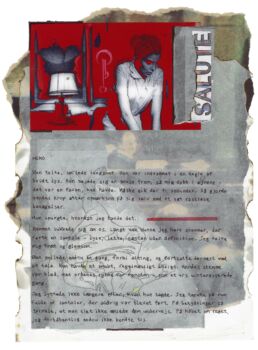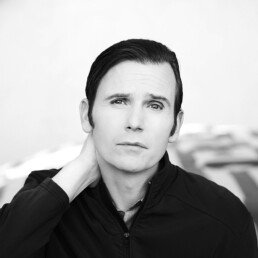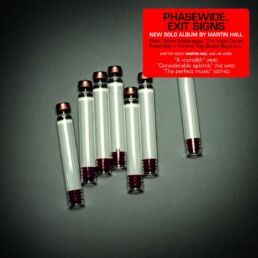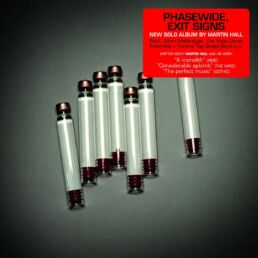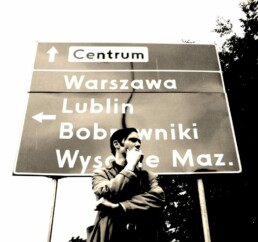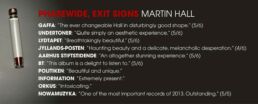MEMO
MEMO
POSTER (SPECIAL PRINT)
JULY 2013
DET BRUUNSKE PAKHUS
In collaboration with Det Bruunske Pakhus Martin Hall released the graphic work Memo in July 2013, a reproduction of an original piece of artwork combining poetry, painting and drawing.
The print is published in the format 61 x 45 cm and was made available in 100 numbered and signed copies.
All profits from the sale went to Det Bruunske Legat, a grant given to a young musical talent.
The artwork is made by Hall. Its photographic motive is based on a Christian Skeel work.
HALL AT THE COURT THEATRE
HALL AT THE COURT THEATRE
In the wake of the release of the critically acclaimed album Phasewide, Exit Signs Martin Hall played his first concert in Copenhagen with band since 2009, a concert that took place at the legendary venue The Court Theatre on the 25th of April 2013. The sold-out performance received a 6 out of 6 star review on Denmark’s leading music site GAFFA. The summation of the review goes like this:
“It’s often said that Martin Hall is a brand of its own in Denmark. I’m about to object that this is not entirely true. At least I haven’t met that many of his calibre abroad either. At his best Hall belongs to the international top class of performers.”
You can read the full review (in Danish) at the GAFFA site.






All photos taken by Jacob Dinesen and published by courtesy of GAFFA.
At the concert at The Court Theatre Martin Hall played primarily new material. Whereas his live-performances in 2009 were characterized by a set of new arrangements of older songs, the 2013 show featured mostly new songs as well as selected interpretations of the songs on classical album If Power Asks Why recorded by mezzo-soprano Andrea Pellegrini.
The musical line-up at the concert featured Johnny Stage (guitar and keyboards), Ida Bach Jensen (bass and electronics), Henriette Groth (piano, keyboards, clarinet and viola) and Sisse Selina Larsen (drums and percussion).
Set list: 1) “Retrograde”, 2) “Muted Cries”, 3) “A Garboesque Leaning towards Seclusion”, 4) “Rather Quotable than Honest”, 5) “Emblematic”, 6) “Hope Is a Lack of Information”, 7) “MILFs, Cum and Schopenhauer”, 8) “An Attempt of Interruption” (featuring accordeonist Bjarke Mogensen), 9) “Dead Horses on a Beach”, 10) “Other Rooms”, 11) “Images in Water” and 12) “Phasewide”.
Encores: 13) “If Power Asks Why” and 14) “Synthesis” + an additional extra encore 15) “Meth”.
The Court Theatre (Teatermuseet i Hofteatret) is an architectural gem in the heart of Copenhagen, a piece of Danish history situated at Christiansborg, The Danish Parliament. In the 18th century the Court Theatre was an active institution forming the political and cultural development of the general public. The Court Theatre was built during the 1730’s and in 1766 it was rebuilt and turned into the neo-classicistic style still characterizing the entrance of the place. At the beginning of the 1840’s King Christian the 8th reshaped the theatre, turning the place into its present Biedermeier style with red velvet seating and theatre boxes.
RECENT RE-RELEASES OF THE HALL BACK CATALOGUE
During the last couple of years a fair amount of re-releases of old, otherwise hard-to-get titles from the Martin Hall catalogue have been issued as cd or download. Most of the cd-versions contain either bonus material or new extensive liner notes. Read more about the re-releases here:
Relief/Cutting Through (remastered cd-edition).
Apparently All The Same (remastered special edition).
Random Hold (remastered special edition).
Before (legendary support gig for New Order).
SS-Say/Pesteg Dred (remastered cd-edition).
Catalogue (box set with 5 audio cd's and one dvd 1980-2007).
Catalyst (singles 1982-2008).
Recently Presence and Imperfect were released as remastered versions on iTunes as well.
HALL LIVE AT THE COURT THEATRE – 6 OUT OF 6 STARS
Martin Hall's sold-out live performance at The Court Theatre in Copenhagen on April 25 has just received a phenomenal 6 out of 6 star review on Denmark's leading music site GAFFA. The summation of the review goes like this:
“It’s often said that Martin Hall is a brand of its own in Denmark. I’m about to object that this is not entirely true. At least I haven’t met that many of his calibre abroad either. At his best Hall belongs to the international top class of performers.”
You can read the full review (in Danish) at the GAFFA site where you'll also find a line of photos taken during the concert.
Photos taken by Jacob Dinesen (courtesy of GAFFA).
PHASEWIDE, EXIT SIGNS
PHASEWIDE, EXIT SIGNS
Martin Hall’s 2013 album song by song
In the following article written for GAFFA (Denmark’s biggest music magazine) Martin Hall comments upon each of the ten tracks on his new album Phasewide, Exit Signs released on the 2nd of April 2013. The record was his first solo release for seven years. Hall didn’t give any Danish interviews in relation to the release.
1. Emblematic:
I recorded the opening track ”Emblematic” with the pianist Othon Mataragas whom I’d met in relation to a performance at Warehouse 9 in 2010. Othon has formerly worked with names such as Marc Almond, Current 93 and now deceased Peter Christopherson from Coil and Throbbing Gristle, but is classically educated, so there are quite a few parallels between his way of working and my own approach to music. I think the song is a good opening to the new album.
2. Muted Cries:
The main recording for this track is made in Montreal with another pianist, the Danish newcomer Linus Carlsen. From an overall point of view the songs on Phasewide, Exit Signs form a kind of musical logbook – they’re all written and recorded in a number of different contexts around the world. ”Muted Cries” was one of the first tracks I finished for the album and I think the song captures the sense of recurrent disorientation that I’ve felt in my life for the last couple of years very well. I always feel relieved when music plays itself as easily as this is the case.
3. L:
As it is with most music, the individual experience is often governed by the context it appears in. ”L” is an intermezzo, a crossover point, but nevertheless an important part of the full picture. Underneath the title you can hear the album’s “sub-sound” work … as it does most of the time throughout the record.
4. Tin Music:
The vocal for this track is recorded in a hotel room in the Polish city Białystok late at night, just after I had performed at The Podlasie Opera in the summer of 2012. I was completely exhausted, but travelled with a dictaphone, and the sheer mood and atmosphere surrounding the visit and the night itself – the city, the old opera and the enthusiastic responses from the audience – kept resonating in me. I hadn’t expected that I would use the recording for anything, but later in the process, after I’d returned to Denmark, I was quite surprised to hear how “ensouled” the recording was.
In general the new album is characterized by an occasional almost sketch-like production where the methods of recording include the application of dictaphones and old-fashioned cassette machines. In its final version ”Tin Music” was extended with a complete string arrangement, but at its core the song is based upon this very frail recording made in the hotel room.
5. Meth:
Something as straightforward as a declaration of love. The themes of the new album revolve around subjects such as loss, beauty and perdition. Aging and wear. The female body and its ever-changing cartography. The record is a series of instant images exposed over a quarter of a century. My generation has reached the age now where the years show, and if you’ve followed another person closely over a longer period of time, then it can be equally heartrending and touching to witness the silent changes that occur, physically as well as mentally. This also applies for the figures in the periphery – faces I remember from my early youth and by chance occasionally catch a glimpse of. Many of these people have paid a high price for their uncompromising way of life. I particularly recall a girl I once knew, a very composed as well as completely lost individual who basically survived on coffee and cigarettes and the stuff in-between. Later she took her own life. I imagine what it would have been like to sit in front of her alive, today.
However, as it generally is, a song rarely revolves around one single image – the face it describes is often put together by several characteristics. In the same way ”Meth” circles around a polyphonic gallery. It’s a portrait based on several lives.
6. Retrograde:
Quite a few people probably think that you write songs all the time if you’re a songwriter. Well, it’s not like that for me. I write remarkably few songs and lyrics for myself. I guess it’s an occupational hazard when you’re working with music, that it easily begins to feel quite pathetic to constantly express oneself. It has become quite a challenge for me to write lyrics for myself. By the same token it’s very rewarding if a song has its own power of persuasion – its own will and its own ”voice” – something that ”Retrograde” had from the very start.
It’s the second song on the album where I collaborate with Linus Carlsen and already the day after I wrote the basic melody line on top of the chords, the vocal version of the song was recorded. Technician and co-producer Johnny Stage listened one time to the tune after which he replaced the studio’s professional microphone with an old clips mike which he then carefully installed in the alcove of the window at the other end of the room. Then we recorded the song in the first take.
7. Forgetting the Details:
This track is recorded with Christian Skeel whom I have worked with on several occasions – e.g. on our 2001 album Metropolitan Suite. ”Forgetting the Details” was the first track I recorded for Phasewide, but for some reason the project then went into pause mode for quite a while. Meanwhile a very different version of the song was released in form of a single called ”Mirrorball”.
8. Red Lips, Marble Eyes:
I’ve always wanted to work with a brass band – not coming from any wish to explore the jazz genre as such, more out of a fascination for the kind of music used at funerals in the Southern States of America, particularly New Orleans … the swells of colonial melancholy and the sounds of twisted brass, the worn-out suits and starched shirts’ stubborn attempt to keep the ritual going. As a little boy I once saw a film where a funeral procession slowly passes by a crowd of random observers on a street corner in the French Quarter of the town. The funeral party is full of grieving people and musicians with trombones and trumpets, all dressed in black. The next minute one of the spectators is killed. All mechanically the mourning procession then picks up the corpse and puts it in the coffin – the very object that the dead guy stood and watched seconds earlier.
I wanted ”Red Lips, Marble Eyes” to have a similar twisted ceremonial sense to it … a kind of distressed reluctance. Make it sounds as if the song was about to crumble under its own weight. However, it demands quite an effort on the part of the musicians to make things limp in that manner, but my expectations were completely fulfilled by the team. It’s actually the only place on the album where you’ll find real percussion. Horns and percussive instruments.
9. Site Specific:
”Incestuous needs, a tender display on your pillow”. From Salon Kitty to Reeperbahn – it’s all about cues and impulses. I don’t think one should try to explain everything. As a matter of fact I think it’s been one my career’s biggest errors … that I’ve far too often tried to explain myself. It’s much better to just tell the tale.
10. Phasewide:
The title track and last song on the album was recorded under improvised circumstances one late night/early morning. I’ve always been very fond of recordings that make use of the authentic sound environment and on this track it’s quite evident how the room is working alongside the performance itself. The take appears as a kind of sonic biopsy. Not that this fact in itself necessarily is a good thing, but taking into account all the self-criticism and self-allergies that have aggregated in me during the years, then it’s slightly remarkable for me to be able to listen to the recording afterwards and not focus entirely on my own role as a singer.
Those who have followed my work over a longer period of time are probably aware of the fact that I don’t really regard myself as a great singer. However, a lot of the performers I’ve listened to during the years aren’t necessarily technical brilliant either. You work with what you’ve got and express yourself with the available means. What you might not have of technical superiority, you can hopefully compensate for with some kind of intimacy or personal presence. Hopefully. But that’s all up to the listeners to assess.
Martin Hall, Maundy Thursday 2013 (March 28)
"MUTED CRIES" – NEW VIDEO OUT
”Muted Cries” is a song taken from the forthcoming Hall album Phasewide, Exit Signs that will be released on the 2nd of April 2013. The track is recorded in Montreal and Copenhagen with pianist Linus Carlsen and guitarist Johnny Stage.
The video is filmed by the Danish photographer Robin Skjoldborg and edited by Henrik Möll. Additional footage is taken from a performance made by Anastasija Kiake.
PHASEWIDE, EXIT SIGNS
PHASEWIDE, EXIT SIGNS
MARTIN HALL
LP/CD
APRIL 2013 (EUROPEAN RELEASE OCTOBER 2013)
PANOPTIKON (OPTIK 40)
Phasewide, Exit Signs is a Martin Hall solo album – at its release his first in seven years – a musical log book recorded in cities such as Montreal, London and Brussels.
On the record Hall works with several international collaborators, one being the Greek-English pianist Othon Mataragas (probably best known from his works with names such as Marc Almond, Current 93 and Peter Christopherson from Coil and Throbbing Gristle).
1. Emblematic (2:23)
2. Muted Cries (4:18)
3. L (1:49)
4. Tin Music (6:55)
5. Meth (8:29)
6. Retrograde (3:44)
7. Forgetting the Details (5:11)
8. Red Lips, Marble Eyes (4:29)
9. Site Specific (2:36)
10. Phasewide (5:45)
EMBLEMATIC
I felt a sigh pass your lips
I saw the weight on your eyelids
Yet there you swagger and there you go
The mise-en-scène of your mercy drome
Too many images at play
Too many faces in a day’s work
Your sweet incentive, it’s so relentless
My grief’s been waiting for this day
No easy answers, only hard choices
I guess we came to the end of the road
Your random gender, my desolate needs
The splintered voices of lost beliefs
Trading commodities with no fixed presets
No traces left of a long gone starlet
Pornographers and secondhand consumer rights
All sons and lovers of 70’s delight
MUTED CRIES
The clouds in her eyes
A whispering need
Shedding her light all over me
Try recall the cities in twilight
The clubbing
The cigarette sky
As you notice the silence
The carvings
The memory lines
The muted cries
A jaded desire
A comforting need
Walls coming down
On callous beliefs
Try recall the cities in twilight
The clubbing
The cigarette sky
As you notice the silence
The carvings
The memory lines
The muted cries
TIN MUSIC
Tin music
Seeping out into the street
Jasmine scented, stagnant air
Hatching any need
While the summer lingers on you tell the tale
Still hiding
Just a face within the crowd
Running ‘round
Falling down
Guess it’s all the same
So embarrassed by the loss of all this weight
The intimacy of casual ease
It’s no relief
METH
Wide eyes, swollen lips
She examines herself like she’s about to fade
Into air
Into all she disbelieves
Skin engraved with burns
Like a jaded belief about to disappear
There’s no need
To enact this line of ways
Trace the fading needs
The ebbing desirability
You’re turning away
Still hiding your face
Don’t you know your name?
Through all of these years it stayed the same
It’s always been you
I just couldn’t choose
Lines
She wets her lips
Leaning back with her arms wrapped around her knees
To adjust
To recalibrate the need
Words in pantomime
Eyes like shimmering marble
Pressure veiled by grace
Once again
Seems to settle for reserves
Don’t you feel the weight?
The slight hesitation, the delay
Aesthetic beliefs
Won’t cover this need
Don’t you know your name?
Through all of these years it stayed the same
Whatever I do
It’s always been you
Try to hold back the dawn
Try to hold back the morning
Hold back the night
If just for a while
RETROGRADE
Still lying wide awake
Imagining your face
A cool, white offering
Caught in this retrograde
Lips drawn and quivering
Veins faintly shimmering
All pierrots in rags
Spastics and acrobats
Discredit every move
Condolences to prove
The friction and the heat
Your genuine belief
A gravitational pull that never seems to decrease
FORGETTING THE DETAILS
Cheekbones made of light
Somewhere it’s morning
The languid grey of night
Leaving the fragrance of a cry
Guess you’re sliding back into your life
The pressure on your eyelids
Patterns of waiting
Of suffocating
Replaying the same scene
Recalling the same dream
Cover any feeling
Cover any reason now
You’re breathing the same air
The same hysteria
Like a mirrorball that shines
Just another flash of light
Deteriorating
Forgetting the details
Rewriting the scene in your mind
The exit signs of light
She’s lying beside me
She’s hidden in a sigh
In the changes of a room
Guess she’s sliding back into her life
The pressure on her eyelids
The time that it’s taking
Before she wakens
It feels like a lifetime
A memory rewind
RED LIPS, MARBLE EYES
Lights from cars slowly driving by
Her eyes reflecting a desert sky
Lover’s rental
Sentimental child
Guess you’re hiding
Down along the line
Dresses in fields
Shirts on the sea
Imagine yourself then
Imagining yourself now
Red lips and marble eyes
Bourgeois bohemia high
They say nobility grows out of contained emotion
Well she feels a bit bloated right now
Skin like alabaster
Swollen like a plaster
I guess she’d rather look like somebody else
It’s like a seal
A heap of needs
Imagine yourself then
Imagining yourself now
Another poster girl
Fake fur and high-heel spurs
All of these sons of Cain and girls with wings
Still staring at the ceiling
The illegitimate desires never fade
SITE SPECIFIC
Incestuous needs
A tender display on your pillow
Diverging beliefs
Written all over your face
The look in your eyes
A desolate kingdom of reason
The crown that you hide
Revealing a pagan belief
Enemy
Find the key
Anomaly
PHASEWIDE
Look at us now
This is what we’ve become
She can’t recognize anyone
Her arms ‘round her knees
Her eyes closed to see
Don’t expect too much
This is what we’ve got
Let’s just lie here
Watch the lights appear
Cosmetic disapproval
Descending like snow
The residue of daylight
Flickers in the street
Flickers in the heat
Don’t expect too much
This is all we’ve got
Let’s just lie here
Watch the lights appear
”Haunting beauty and a delicate, melancholic desperation.”
Rating: 4 out of 6 stars
Jyllands-Posten – Anders Houmøller (March 27, 2013)
(Denmark’s biggest newspaper)
”The ever changeable Hall in disturbingly good shape.”
Rating: 5 out of 6 stars
Gaffa – Finn P. Madsen (March 31, 2013)
(Denmark’s biggest music magazine)
”This album is a delight to listen to.”
Rating: 5 out of 6 stars
BT – Henning Høeg (April 1, 2013)
(Denmark’s equivalent to The Daily Mirror)
”Breathtakingly beautiful.”
Rating: 5 out of 6 stars
Lydtapet – Peter Krogh (April 3, 2013)
(Danish site for independent music)
“Beautiful and unique.”
Politiken – Kim Skotte (April 3, 2013)
(The Danish equivalent to The Guardian)
”An altogether stunning experience.”
Rating: 5 out of 6 stars
Aarhus Stiftstidende – Thomas Nygaard (April 4, 2013)
(Danish daily newspaper)
”Extremely present.”
Information – Anna Ullman (April 8, 2013)
(Denmark’s equivalent to The Independent)
”One of the most important records of 2013. Outstanding.”
Rating: 5 out of 5 stars
Nowamuzyka – Łukasz Komła (April 15, 2013)
(Polish site for independent music)
”Quite simply an aesthetic experience.”
Rating: 5 out of 6 stars
Undertoner – Thor Penthin Grumløse (May 1, 2013)
(Danish site for independent music)
“A very positive surprise … impressive.”
Rating: 11 out of 15 points
Baby Blaue – Siggy Zielinski (August 23, 2013)
(German site for independent music)
”To bow before such an artist is a duty, to enjoy his art a pleasure not to be denied.”
Rating: 8 out of 10 points
Darkroom Magazine – Roberto Alessandro Filippozzi (September 14, 2013)
(Italian site and magazine covering independent music)
“Intoxicating … be sure to check it out.”
Orkus Magazine – Manuela Ausserhofer (September 25, 2013)
(Major German music magazine)
“A quiet, thoughtful and spherical album.”
Rating: 7 out of 10 points
Der Hörspiegel – Michael Brinkschulte (September 29, 2013)
(German site for independent music)
“A testament to creativity and sovereignty that allows deep insights into what a brilliant artist Hall is.”
Alternativ Musik – Tristan Osterfeld (October 1, 2013)
(German site for alternative music)
“A rousing album.”
Music Scan – Daniel A. Rabl (October 3, 2013)
(German music site)
“Dark and hypnotic: Hall understands the award of forging strong tension.”
Rating: 12 out of 15 points
Musik Reviews – Jochen König (October 17, 2013)
(German site for alternative music)
“A poignant, but obscure experimental album that comes in a kind of cabaret format making it more accessible.”
Rating: 6 out of 7 points
Side-Line Music Magazine – D.P. (December 17, 2013)
(Belgian music site)
Martin Hall: Vocals, dobro, guitar, tapes and keyboards
Othon Mataragas: Piano
Linus Carlsen: Piano
Johnny Stage: Guitar, mandolin, glockenspiel and ring modulator
Henriette Groth: Piano
Ida Bach Jensen: String bass
Eskild Winding: Harmonium
Peter Marott: Trumpet
Mads Mathias: Alto saxophone
Vincent Nilsson: Trombone
Jakob Munck: Sousaphone
Esben Duus: Snare drum and percussion
Søren “Blackfoot” Frost: Bass drum and percussion
Christian Skeel: Piano, string arrangements
The Vista Dome Ensemble: Orchestra
Karoliina Koivisto: Solo violin
Cathérine: Speak
Nele Devillé: Televox
Design: Kenneth Schultz
Photo: Territorium
Phasewide, Exit Signs is recorded on a series of different locations around the world. It’s characterized by an occasional almost sketch-like production where methods of recording include the application of dictaphones and old-fashioned cassette machines (as an example one lead vocal is recorded in a hotel room in Białystok in Poland). Although the album both musically and lyrically remains soaked by a strong sense of isolation, the many different places used during the recordings have obviously all had an impact on the final sound and style of the title.
Martin Hall didn’t give any Danish interviews in relation to the release of the album, but wrote the following notes for the Danish music magazine GAFFA:
In October 2013 the album was released in Germany, Austria and Switzerland where it received excellent reviews. In relation to the European launch Hall gave one of his rare interviews to the German music magazine Orkus. You can read the English translation of the interview here.
At the end of the year Martin Hall was nominated for two GAFFA awards (in the categories “Danish album of the year” and “best Danish male artist”). Furthermore Phasewide, Exit Signs was elected “album of the year” by the Polish site Nowamuzyka (top 10 featured artists such as Flaming Lips and Mazzy Star).
”The ever changeable Hall in disturbingly good shape.”
( * * * * * )
Gaffa (Denmark’s biggest music magazine)”Haunting beauty and a delicate, melancholic desperation.”
( * * * * )
Jyllands-Posten (Denmark’s biggest newspaper)”To listen to Phasewide, Exit Signs is quite simply an aesthetic experience.”
( * * * * * )
Undertoner (Danish site for independent music)“Breathtakingly beautiful.”
( * * * * * )
Lydtapet (Danish site for independent music)”An altogether stunning experience.” ( * * * * * )
Aarhus Stiftstidende (Danish daily newspaper)“Beautiful and unique.”
Politiken (The Danish equivalent to The Guardian)“Extremely present.”
Information (Denmark’s equivalent to The Independent)”This album is a delight to listen to.”
( * * * * * )
BT (Denmark’s equivalent to The Daily Mirror)“One of the most important records of 2013. Outstanding.”
( * * * * * )
Nowamuzyka (Polish site for independent music)“Intoxicating.”
Orkus Magazine (major German music magazine)
DARK SPY INTERVIEW
DARK SPY INTERVIEW
Interview with Martin Hall made by Kai Grothaus for the German magazine Dark Spy (#51, February 2013)
This interview was made in relation to the German release of the Martin Hall album If Power Asks Why featuring the two classical musicians Andrea Pellegrini and Tanja Zapolski.
A wonderful greeting to you. How are you?
– All things considered, I would say okay.
Please introduce yourself to our readers.
– I’m a Danish singer, composer, musician and writer who made my debut with the post-punk band Ballet Mécanique. I don’t think our first album The Icecold Waters of the Egocentric Calculation made it to Germany, but a fair amount of my electronic solo records from the 80’s did – Relief, Cutting Through and later on Random Hold. Don’t know if these titles ring any bells, otherwise so be it. However, at the moment I’m primarily working with classical musicians, particularly the singer Andrea Pellegrini and the pianist Tanja Zapolski with whom I have recorded the new album.
What can you tell us about this collaboration?
– It’s very wonderful to work with such great musicians. Andrea’s voice is fabulous. She’s a quite Wagnerian figure – her pose and dark mezzo-soprano go well with my songs. Combined with Tanja’s virtuous capacity as a pianist it allows me to write music that I would never be able to perform as a solo artist.
Your new album „If Power Asks Why“ comes out in a few days. What can the listeners expect?
– A quite theatrical experience really. It’s a series of piano-based “hybrid lieder” you might call it, nine new songs all characterized by a high degree of sombre drama. Titles such as ”Dead Horses on a Beach” and ”Hope is a Lack of Information” might give you a sense of the lyrical nature of the project. The songs aren’t very optimistic, rather passionate objections against any standardised parameters of desire – a safe haven for allergic souls. Whether you’re into avant-garde music, dark wave stuff or Weimar Berlin, I think there’s a chance you’d like it.
Your music seems very classical. What are your musical roots?
– I grew up with equal amounts of Stravinsky and Sex Pistols. Both artists broke new ground at the time of their arrival and although their backgrounds and talents might be very different, they both had a massive impact on modern culture. Being a teenager in the post-punk era I really had a great musical education via artists such as Throbbing Gristle, Joy Division and Cabaret Voltaire as well as record labels such as Les Disques du Crépuscule. There was a strong urge to communicate through music in this pre-internet era, a great interest in the wider artistic endeavours of any subculture, past or present.
Tell us something about the basic concept for “If Power Asks Why”?
– The album is driven by a strong sense of repulsion towards mediocrity. It’s a statement against cultural confinement. The full quote of the title is an old Aleister Crowley phrase that goes: “If power asks why, then power is weakness”. Obviously this is a quite controversial statement, but when it comes to personal desires and longings you can’t really reason with urge. Reason only acknowledges itself and that presents a lot of limitations to a happening life. Through conflict we define and shape ourselves. The title is basically a salute to life.
Could you tell us something about the members of Pellegrini/Zapolski/Hall?
– Andrea Pellegrini is half Italian, a great singer and a very proud character. Tanja Zapolski is half Russian, an amazing pianist still in the making. And then there’s me … a kind of lost poetic soul, I guess, writing his desolate songs about alienation and disgust. That’s the short version.
On YouTube you can see a video called “MILFs, Cum and Schopenhauer” from the album. What is the context between these three words?
– The song is a textbook example of a postmodern sexual delirium, a media-induced panic attack. You’ve got this person at a party who’s really sick and tired of what’s going on around her and basically she’s just saying “give me anything else than what I’m in the middle of”. She’s flooded by images from pornographic films, male standards of sexual behaviour and old Schopenhauer quotes and she’ll take any alternative that offers itself to get out of the situation she’s in. Often sex becomes a last resort to avoid either boredom or panic.
Your videos are black-white and very classical. Would you say that your music is more classical?
– This particular album might be, but it’s really just a set of basic songs performed in an operatic fashion. I love the drama of the opera, this sense of “no, things are not okay and now I’m going to come at you with all I have”. In the world of opera you don’t accept a broken heart, you want to annihilate your rival. It’s all completely over the top, but in many ways it’s a more accurate description of how a person might feel than a lot of pedagogical nonsense. I’m sorry to say, but neither art or love is very democratic – it’s all about will, emotion and personal desire.
Are there any last words you want to get to our readers?
– Not really. That’s what I like about you asking the questions – it takes the responsibility off my shoulders.
We thank you for this interview and wish you all the best.
– Thank you for the attention.




”IF POWER ASKS WHY” RECEIVES GREAT REVIEWS
The Martin Hall album If Power Asks Why featuring mezzo-soprano Andrea Pellegrini and classical pianist Tanja Zapolski has received a line of great reviews. We bring you a few quotes:
Gaffa (5 out of 6 stars): ”Excellent melodic material and brilliant arrangements ... a great success from start to finish.” ( * * * * * )
Information: ”Martin Hall brilliantly stages mezzo-soprano Andrea Pellegrini and pianist Tanja Zapolski in a masquerade of classical lieder and perverted pop.”
DR2’s Smagsdommerne (the weekly cultural recommendations on Danish National Television): ”Fantastic! An incredibly good record.”
P6 Beat (Danish National Radio): “A masterly performed principal work!”
Berlingske Media: ”A deliciously decadent universe.”
Fyens Stiftstidende: ”Outrageous? Eccentric? Yes ...”
Politiken: ”Pellegrini’s warm and enchanting voice has the capacity to melt icebergs.”
Tempelores: ”Give yourself the opportunity to be amazed and get this release.”
Furthermore the album has been nominated for the Danish National Radio’s P2 Award 2013.
"NOSTATIC!" RECEIVES EXCELLENT REVIEWS
Martin Hall's new book Nostatic! has received a line of excellent reviews in the Danish medias. Jyllands-Posten, Denmark's biggest daily newspaper, awards Hall's new book with 5 out of 6 stars. Likewise does Fyens Stifstidende. Politiken, the Danish equivalent to The Guardian, gives the release 4 out of 6 stars.
Among many other things Jyllands-Posten writes the following: “Martin Hall keeps a fine balance between his vast knowledge and his burning commitment. In short, he writes with style.” ( * * * * * )
Fyens Stifstidende proceeds this kind of appreciation with statements such as: "Outstanding essays: Even at the level of details the book is eminent." ( * * * * * )
Finally Politiken writes: "Martin Hall writes well and appetizing. Nostatic! is unsentimental all the way through. The book is interesting and the handling of the individual subjects is distinctly catching.” ( * * * * )


